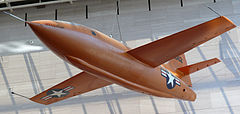International orange
This article provides insufficient context for those unfamiliar with the subject. (June 2023) |
International orange is a color used in the aerospace industry to set objects apart from their surroundings, similar to safety orange, but deeper and with a more reddish tone.
Variations
[edit]There are several variants of international orange.
International Orange
(Engineering)
#BA160C
International Orange
(Golden Gate Bridge)
#F04A00
International Orange
(Aerospace)
#FF4F00
Aerospace
[edit]| International Orange (Aerospace) | |
|---|---|
| Hex triplet | #FF4F00 |
| sRGBB (r, g, b) | (255, 79, 0) |
| HSV (h, s, v) | (19°, 100%, 100%) |
| CIELChuv (L, C, h) | (59, 152, 18°) |
| Source | htmlcsscolor.com[1] |
| ISCC–NBS descriptor | Vivid reddish orange |
| B: Normalized to [0–255] (byte) | |
The Advanced Crew Escape Suits pressure suits worn by NASA astronauts and the previous Launch Entry Suit use this color,[2][3] as opposed to the lighter tone of safety orange used by the United States Air Force's high-altitude suits. This was also planned for the Constellation Space Suit systems that were to be flight-ready by 2015.

The Bell X-1, the first airplane to break the sound barrier, was also painted in International Orange.

Golden Gate Bridge
[edit]| International Orange (Golden Gate Bridge) | |
|---|---|
| Hex triplet | #F04A00 |
| sRGBB (r, g, b) | (240, 74, 0) |
| HSV (h, s, v) | (18°, 100%, 94%) |
| CIELChuv (L, C, h) | (56, 143, 18°) |
| Source | spycolor.com[4] |
| ISCC–NBS descriptor | Vivid reddish orange |
| B: Normalized to [0–255] (byte) | |
The tone of international orange used to paint the Golden Gate Bridge in San Francisco, California is slightly lighter than the standard International orange used by military contractors and in engineering, thus increasing its visibility to ships, but darker than the one used in aerospace. The international orange paint used on the Golden Gate Bridge is specially formulated to protect the bridge from the danger of rust from salt spray off the ocean, and from the moisture of the San Francisco fog that frequently rolls in from the Pacific Ocean through the Golden Gate to San Francisco Bay.[citation needed] The 25 de Abril Bridge in Lisbon, Portugal also uses this color.[5]
Engineering
[edit]| International Orange (Engineering) | |
|---|---|
| Hex triplet | #BA160C |
| sRGBB (r, g, b) | (186, 22, 12) |
| HSV (h, s, v) | (3°, 94%, 73%) |
| CIELChuv (L, C, h) | (40, 124, 13°) |
| Source | FedStd 595[6] |
| ISCC–NBS descriptor | Vivid red |
| B: Normalized to [0–255] (byte) | |
The adjacent box displays the generic tone of international orange used by military contractors and in engineering generally.
The source of this color is Federal Standard 595, a U.S. federal government standard set up in 1956 for paint colors which is mostly used by military contractors and also in engineering. International Orange is designated as Federal Standard 595 color #FS 12197.
In accordance with air safety regulations, some tall towers, e.g. Tokyo Tower and the Yerevan TV Tower, are painted in white and international orange.[7]
Sports
[edit]The World Football League used international orange (instead of the traditional white) for the stripes on their footballs. The league also painted a short international orange mark on the field at the two-yard line.
Trucking
[edit]Schneider National paints its trucks, tractors, and trailers "international safety orange" (Omaha orange, PMS 165).
See also
[edit]References
[edit]- ^ "HEX color #FF4F00, Color name: International Orange, RGB(255,79,0), Windows: 20479. - HTML CSS Color". www.htmlcsscolor.com.
- ^ "Why Are Astronauts' Spacesuits Orange?". Archived from the original on 2011-12-10. Retrieved 2010-07-18.
- ^ "NASA - The Spacesuit". Archived from the original on 2010-05-20.
- ^ "#f04a00 hex color information". www.spycolor.com.
- ^ "Frequently Asked Questions about the Golden Gate Bridge". Golden Gate Bridge. Archived from the original on 2015-08-10. Retrieved 2020-06-12.
- ^ "FED-STD-595 and AMS-STD-595 Fan Decks and Color Chips". fed-std-595.com.
- ^ "Tokyo Tower Data". Nippon Television City Corporation. Archived from the original on 2008-04-30. Retrieved 2012-05-26.




